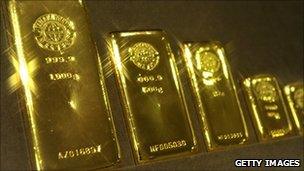Libya holding huge gold reserves IMF data shows
- Published

Libya has declared gold reserves worth more than $6bn at current prices, thought to be held largely at home.
The reserves are substantial, ranking in the global top 25, according to International Monetary Fund (IMF) data.
They could potentially be used to finance Colonel Gaddafi's government at a time when it is subject to international financial sanctions.
It might be possible to transport the gold to other African countries and sell it.
Sahara Desert
This is rather speculative, it must be said, but the gold could in principle generate millions of dollars in revenue, which could be used for example to pay foreign fighters.
Raising cash this way would face challenges.
Transport out of Libya would be difficult - using the country's Mediterranean ports would be too dangerous with military action under way.
The alternatives would involve the crossing of borders with other African countries in the Sahara Desert.
It's also unlikely that Libya could get anything close to the international market price for any gold disposed of in this kind of unconventional way.
Nonetheless, there are possibilities for a government desperate to raise funds.
The gold reserves that Libya could dip into are very large for what is a small country in terms of population - with six million people - and in terms of economic activity.
Shrewd investment
The IMF data show Libya's reserves to be 4.6 million ounces, a figure of nearly 144 tons. At current market prices the value is over $6bn.
There are twenty countries with larger gold reserves. But, with the exception of Lebanon, they are all much richer or much larger in population.
Britain for example has twice as much gold, but ten times the population and an economy more than 30 times the size.
A closer comparison is Algeria, which is, like Libya, a North African oil producer - it has 20% more gold reserves, but more than five times the population.
So why does Libya have such a large holding of the precious metal?
Given how the the gold price has climbed in recent years, you might argue that it is the result of shrewd investment decisions.
But Colonel Gaddafi does have past experience of being on the receiving end of international sanctions.
So the fondness for gold could well reflect a desire to have an asset that can be kept at home, away from foreign enemies.
It is not one that is easy to turn into cash in current circumstances.
But it is more usable than financial assets or stakes in firms in the countries that are trying to starve him of funds.
- Published1 March 2011
- Published31 March 2011